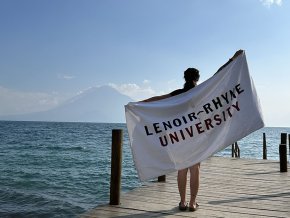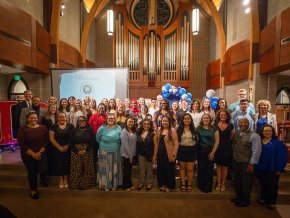Instructional Studies, B.A.
The instructional studies major provides you with a flexible path to a non-licensure education degree and a broad range of instructional opportunities outside the traditional public school classroom such as in independent or private schools and nonprofit organizations.
The degree provides rigorous training and clinical experiences to prepare you for a career as an educator in non-public school settings. The B.A. in Instructional Studies is a degree-only program option. This innovative program allows you to select special areas for emphasis as you prepare for your educational career in elementary, middle grades, religious development, special populations or international education.
The major is designed to furnish cutting-edge training in instructional technology. You will receive exceptional mentoring and support in preparation for professional settings after LR. Job search and placement support is provided for all students.
Request Information
Take the next step toward completing your B.A. in Instructional Studies degree at Lenoir-Rhyne University.
Get StartedTake the next step toward completing your Bachelor of Arts in Instructional Studies degree at Lenoir-Rhyne University.
Learning Outside the Classroom
Teacher preparation is a demanding program that necessarily integrates classroom theory with “real world” application. Successful majors will engage in substantial field experiences in school classrooms.
Additionally, you will complete a full-time internship in the final semester of the program. Many opportunities for community or campus service are available throughout the program, such as curriculum development for LR’s “Little Read” program, private tutoring and numerous other activities through the student organizations in education.

LR provides resources and academic services that enhance my education. I am a more well-rounded individual, eager to graduate and begin my career as a teacher.
Career Opportunities
The education program provides extensive job search and placement support for qualified graduates who complete undergraduate programs.
Majors may find education positions in private and independent schools, as well as other educational/training positions outside the traditional school systems in non-profit agencies and similar settings.
The instructional studies major does not lead to public school teaching licensure.
Major Requirements
A major in Instructional Studies provides a flexible path to a non-licensure education degree and provides a pathway to a broad range of instructional opportunities outside the traditional public school classroom. This major also offers students experiences in alternative settings, such as independent or private schools and non-profit organizations. The degree provides rigorous training and clinical experiences to prepare students for a career as an educator in non-public school settings. This major does NOT lead to a public school teaching licensure. The BA in Instructional Studies is a degree-only program option.
-
General Education Requirements (37 hours)
Graduation Requirements (4 hours)
General Education Requirements
- Technical Requirements (3 Hours)
-
Major Requirements (29 Hours)
- EDU 316 - Adaptations, Accommodations, & Differentiation
- EDU 219 - Culture Literacy and Learning
- EDU 220G - Child and Adolescent Development
- EDU 241 - Curriculum Instruction & Environmental Design
- EDU 241L - Field Work Lab-curriculum Instruction & Environmental Design
- EDU 274 - Global Education
- EDU 275G - Race, Class and Gender in Education
- EDU 345 - Trends & Issues in Non-public American Education
- EDU 450 - Internship in Non-public Educational Settings
- EDU 451 - Technology in the Classroom
- EDU 455 - Practicum in Non-public Educational Settings
-
Choose One Area of Specialization (24-43 Hours)
(shaded courses are also in major)
Classroom Instructional Settings (Non-licensure): Elementary (34 Hours)- POL 120 - American Government
- EDU 217 - Integrated Arts for the Elementary
- EDU 224 - Foundational Mathematics Content
- EDU 303 - Learning Environments: Thematic Field Experience II
- EDU 307 - Children and Adolescent Literature Hours: 3
- EDU 321 - Foundations of Math (Primary)
- EDU 338L - Foundations of Math Lab
- EDU 397 - General Methods 1, K-6 Hours: 3
- EDU 398 - General Methods 2, K-6 Hours: 3
- EDU 435 - Literacy Across the Content Areas
- SED 252 - Classroom Management in Inclusive & Special Education Settings
- SED 361 - Special Education Assessment & Planning
Classroom Instructional Settings (Non-licensure): Middle Grades (25 Hours)- EDU 219 - Culture Literacy and Learning
- EDU 358 - Curriculum Integration & Middle Grades Philosophy
- EDU 399 - General Methods, 7-12 Hours: 3
- EDU 435 - Literacy Across the Content Areas
Choose at Least 15 Credit Hours from One Area (15 Hours)English/Language Arts*Note that EDU 221 is required.
- COM 111 - Introduction to Public Speaking
- EDU 307 - Children and Adolescent Literature
- EDU 221 - Child and Adolescent Literature*
- EDU 322 - Foundations of Reading (Intermediate)
- ENG 231 - Reading Fiction
- ENG 232 - Reading Poetry
- EDU 328L - Foundations of Reading Lab
- ENG 233G - Reading World Literature
- THR 200 - Theatre Appreciation
- or
- English with a Drama Emphasis.
MathematicsScience- AST 100 - Descriptive Astronomy
- or
- EAR 110G - Physical Geology
- BIO 121 - Principles of Biology I
- BIO 122 - Principles of Biology II
- BIO 203 - Vertebrate Zoology
- or
- BIO 260 - Natural History and Field Biology
- CHE 101 - Fundamentals of General and Inorganic Chemistry
- PHY 110 - Concepts of Physics
- ENV 100 - Introduction to Environmental Scienceor above
Social Studies- ECO 121G - Principles of Economics Macroeconomics
- or
- ECO 122 - Principles of Economics Microeconomics
- EDU 274 - Global Education
- HIS European and Non-Western emphasis at 200 or higher
- HIS United States emphasis at 100 or higher
- ECO, HIS, HUM, POL with state/local focus & world/global focus
Classroom Instructional Settings (Non-licensure): Secondary Education (31 Hours)- EDU 219 - Culture Literacy and Learning
- EDU 399 - General Methods 7-12 Hours: 3
- EDU 435 - Literacy Across the Content Areas
Choose One 24-Credit Hour Specialty Below (24 Hours)English/Language Arts- ENG 231 - Reading Fiction
- ENG 232 - Reading Poetry
- ENG 233G - Reading World Literature
- ENG 235 - Writing Arguments
- ENG 281 - Introduction to Creative Writing
- at least 2 ENG Electives at the 300 level or above
At Least 3 Additional Credit Hours from- ENG 200-level course Hours: 3
- COM 200-level course Hours: 3
- THR 200 - Theatre Appreciation
Mathematics- MAT 150 - Discrete Mathematics I
- MAT 165 - Calculus I
- MAT 215 - Applied Statistics
- MAT 240 - College Geometry
- MAT 255 - Mathematics Seminar I
- MAT 280 - Linear Algebra
- or
- MAT 400 - History and Philosophy of Mathematics
- at least 3 additional math elective credit hours at the 300 level or above
Science- AST 110 - Concepts of Astronomy
- or
- EAR 110G - Physical Geology
- BIO 121 - Principles of Biology I
- BIO 121L - Principles of Biology I Lab
- BIO 122 - Principles of Biology II
- BIO 122L - Principles of Biology II Lab
- CHE 103 - General Chemistry and Qualitative Analysis I
- PHY 121 - General Physics I
- at least 6 additional science elective credit hours at the 300 level or above
Social Studies- HIS 101 - World Civilizations I the Emergence of Global Society to 1500
- HIS 102 - World Civilizations II Assembling a Globalized Community from 1500
- or
- HIS 121 - US History to 1865
- HIS 208G - The Modern Developing World
- HIS 122 - US History since 1865
- HIS 205G - Introduction to East Asian History
- HIS 206G - Introduction to Western European History
- at least 6 credit hours of HIS, HUM or POL courses with state/local focus & world focus, 3 hours of which must be at the 300 level or above
Classroom Instructional Settings: Non-School Based (22-25 Hours)- EDU 219 - Culture Literacy and Learning
- EDU 435 - Literacy Across the Content Areas
- HIS 266 - Public History(required for Science, History, and Art Specialty areas only)
- PSY 320 - Lifespan Development
Choose One Specialty Area BelowScience- Select 15 elective credit hours from Natural Science courses
History- Select 15 elective credit hours from history courses
Art- Select 15 elective credit hours from art courses
Business- Select one of the following business minors: Management, Marketing or Finance
Create Your Own- 15-credit hour specialty area - Courses must be approved by the program coordinator.
Religious Development Settings: Education Specialization (21 Hours)- REL 105 - Reading Scripture
- REL 110 - Christian Thought
- REL 120G - World Religions
- REL 215 - Engaging Religion and Culture
Choose One fromChoose EitherSpecial Populations: Human & Community Education (30-32 Hours)- EDU 316 - Adaptations, Accommodations, & Differentiation
- HCS 200 - Concepts of Human & Community Service Hours: 3
- HCS 320 - Applications of Human and Community Service
- HCS 457 - Internship in Human and Community Service
- SOC 100 - Introduction to Sociology
Choose Four Courses fromChoose One Course from- EDU 219 - Culture Literacy and Learning
- PSY 325 - Brain and Mind
- PSY 420 - Psychological Assessment
- SED 281 - American Sign Language I
- or
- SED 282 - American Sign Language II
- SOC 340 - Sociology of Gender and Sexuality
- SED 252 - Classroom Management in Inclusive & Special Education Settings
- SED 361 - Special Education Assessment & Planning
International Education Specialization (18 Hours)- EDU 219 - Culture Literacy and Learning
- EDU 220G - Child and Adolescent Development
- EDU 274 - Global Education
- HCS 250G - Multicultural Perspectives
- Foreign Language (Non-ASL) 200-level or above, chosen from SPA, FRE, GER or CHI
- Course(s) associated with a Study Abroad Experience
-
General Elective Credits
(If Needed)
-
Total Credit Hours - Minimum 120 hours
On occasion, technical and/or program requirements may also meet specific General Education requirements. Please confer with your program advisor to determine which courses, if any, may be counted accordingly.
All bachelor's degree programs at Lenoir-Rhyne require at least 120 credit hours. If, in combination, General Education, technical, and program requirements do not generate at least 120 hours, additional credits must be completed to achieve 120 hours. These classes may be general electives, or a student may complete a minor or additional major.
Admission & Financial Aid
-
Undergraduate AdmissionOur admission team is here to assist you in making the college search process as easy as possible. Our counselors are happy to provide the information and guidance you need to submit your application, apply for financial aid and scholarships, visit and tour our campus.
-
Financial AidWe recognize that paying for college is a top concern for students and their families. Our financial aid staff is here to provide you with financial aid options and assistance to help you achieve your educational goals.
News & Events

Alyssa Bailey Henson ’23, DNP ’26, completed clinical hours abroad, providing essential care in the Dominican Republic and Guatemala while deepening her passion for nursing.
View More
Lenoir-Rhyne inducted the first members of the Kappa Eta chapter of Alpha Alpha Alpha, the national honor society for first-generation students.
View More